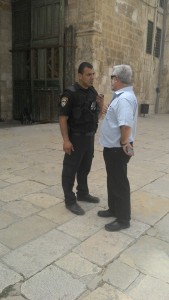Gershon Baskin believes that Israel is “home” in the deepest sense of the word, for Gershon to live in the land of his people and to feel free where he belongs is a great privilege that he is grateful for every day.
‘To be a free people, in our land, Eretz Zion and Jerusalem.”

Gershon Baskin and Police on al-Haram al-Quds al-Šarf (Noble Sanctuary of Jerusalem) / Har HaBayit (Temple Mount)
For me, Israel is “home” in the deepest sense of the word. For me to live in the land of my people and to feel free where I belong is a great privilege that I am grateful for every day.
This year’s independence celebrations were marked with the expressions of joy over the 50 years of liberation and unity of Jerusalem. Throughout Remembrance Day and Independence Day the words “eternal united Jerusalem” must have been said at least every two minutes by every public speaker in every official gathering. Excuse me, dear readers, but never has a lie been repeated so many times by so many people while so few even begin to question it. We may fool ourselves, but we don’t fool anyone else, as was demonstrated by the most recent UNESCO decision regarding Jerusalem.
Our capital of Jerusalem, our historic city, my home and the only place in the world I want to make my home in is not united, is not recognized as being united and is not even recognized as our capital.
Yes, that saddens me. Jerusalem is a very divided city. It is an open city, without physical divisions for most Jerusalemites (there are about 120,000 Jerusalemites who live behind the separation barriers, and for them there are most definitely physical divisions in Jerusalem). But the divisions in Jerusalem are geo-political, identity based and psychological; there are many walls of fear.
There is the most obvious division, between Israelis and Palestinians, but also divisions among the Palestinians themselves, and yes, also among us Israelis.
When two Jerusalemites from two of the many different communities that make up Jerusalem describe their city, there is little doubt that they will describe two completely different places. I know that when I meet with my Palestinian Jerusalemite friends, our views of Jerusalem and our points of reference in Jerusalem are of two entirely different cities. Yes it is possible that this happens in other cities as well – but no other city that I know of has so many people shouting out its unity as much as Jerusalem.
Some 350,000 people – about one-third of Jerusalemites – are not even citizens of the country in which they are living. Their official legal status means their presence here is temporary and arbitrary. Thousands of homes which they built and in which they live are devoid of legal status because their city officials and those of the country in which they are residents do not legalize zoning and building plans and building permits.
A large majority of the poorest people living in Jerusalem are Palestinians. There is a lack of more than 1,500 classrooms to provide public education to these people. The highest rate of crime and the lowest rate of law enforcement are in the areas of Jerusalem where Palestinians live. The Palestinian Jerusalemites cannot vote in Israel’s national elections, nor do they want to. They pay taxes to the State of Israel, but are not represented in the government.
For them Jerusalem is definitely not the united, eternal capital of the State of Israel and the Jewish People.
No, Jerusalem is not united. No, Jerusalem is not recognized as the capital of Israel. Not even West Jerusalem is recognized as the capital of Israel. It has been universally agreed and understood that the status of Jerusalem must be determined through negotiations between Israel and Palestine. It has been universally agreed and understood that Jerusalem is a holy city not only to Jews but also to Christians and Muslims and that the recognition of that fact and the protection of holy places for all three religions must be engraved in political agreements between Israel and Palestine and ratified by the international community. Only when there is agreement between Israel and Palestine – which most likely means that there will be two national capitals in one open Jerusalem – then Jerusalem will be recognized as the capital of Israel.
It is not really relevant that no other people has had its capital in Jerusalem. Nor is it particularly relevant right now that King David established his capital in Jerusalem 3,000 years ago. Nor is it particularly relevant that Jerusalem is mentioned hundreds of times in our holy scriptures or that we constantly pray toward Jerusalem and express our longings to be in Jerusalem. When our capital, our eternal city, is also home to hundreds of thousands who are not part of our story and they have their own story, their own claims, their own rights, we cannot honestly claim unity and freedom in Jerusalem.
I love Jerusalem and I celebrate its uniqueness – its diversity, richness, traditions, music, smells, foods, colors, neighborhoods, its air, atmosphere and sites.
I cross boundaries in Jerusalem and never want to see this city divided by walls (except the Old City walls).
I will truly celebrate our freedom in Jerusalem when our Palestinian neighbors are also free to celebrate their freedom – then Jerusalem will be united in reality.


